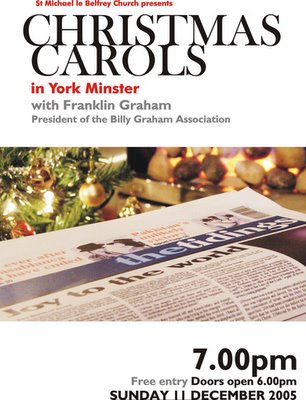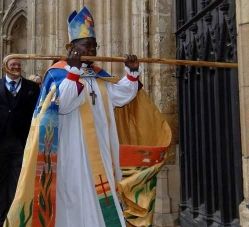It is the time of the year for the best ... of 2005. The papers are starting to print their opinion. Dave Bish is the first blogger I've read to chime in with his selection. I've been planning mine for a while, and have plumped to do 3 book lists: the best; the worst; and today the most influential. I don't know if anyone cares about my opinion, but as Mark Horne recently pointed out, annotated bibliographies are really fun to write. The following is in a rough order of decreasing importance, but there are no numbers because each could easily be in very different places.
'The Judgment Theme in the Sacraments' by CFD Moule (in W. D. Davies and D. Daube ed., The Background of the New Testament and its Eschatology):
Not a book, but an article but it was too good not to be mentioned. Building on my earlier reading of Ian Stackhouse pointing out the Lord's Supper as a place to find the Gospel, this brilliant essay brought the sacraments to life for me. Moule encouraged me to judge myself and see my sin again (and again) to recognize that it is I who should be baptized with death, not Jesus, but to willingly identify with Christ and his undeserved suffering and so undeservingly receive his deserved vindication. Sadly out of print, but you can read my summary of it here.
 The Gospel in Pluralist Society by Lesslie Newbigin:
The Gospel in Pluralist Society by Lesslie Newbigin:
Still swimming about in my head. He has things to say on how we know the gospel is true, and how we preach the Gospel in our culture which must be heard by the church. Particularly powerful is his challenge to the church not to accept societies categorization of religion as private truth, but to declare with conviction and love that the gospel is public truth. I'm less sure about his theology but his thoughts on universalism, election and perseverance are more challenging to me than any I've read since Calvin.
 Inspiration and Incarnation: Evangelicals and the problem of the OT by Peter Enns:
Inspiration and Incarnation: Evangelicals and the problem of the OT by Peter Enns:
Raises questions about how as evangelicals we deal with (rather than ignore) the way the biblical writers used and assumed the peculiar beliefs, stories and hermeneutics of their culture. I am not sure that he answered his questions satisfactorily but he sharpened the questions so that they now bother me a great deal. He also has some interesting stuff to say about theological diversity within the bible. Great to see such honest struggling with the issues, while retaining a firm desire to listen and not judge the God behind the words.
 Finding Joy: A radical rediscovery of grace by Marcus Honeysett:
Finding Joy: A radical rediscovery of grace by Marcus Honeysett:
Dave Bish's book of the year. The first time I started it I choked on the constant references to the merit legalism of Paul's opponents (NPP influences there). I restarted it a couple of months later, and was brought back to the cross again as the most important thing. Brilliant to just think over and over about Christ's sacrifice for us. The cross is central and joy-giving!
 Gospel-Driven Church: Retrieving Classical Ministries for Contemporary Revivalism by Ian Stackhouse:
Gospel-Driven Church: Retrieving Classical Ministries for Contemporary Revivalism by Ian Stackhouse:
Taught me two things. (i) Often what we are doing in the church today (Stackhouse's focus was on revivalism) makes what is happening here and now the most important. Rather than rejoice in what was done for us 2000 years ago we often judge whether the news is good or bad by what is happening now. This is unsustainable and will only bring disappointment. (ii) The sacraments, preaching etc are about remembering, and rejoicing in, that past event in the here and now. Stackhouse's book was very hard to pin down, and I suspect I may have not really got it.
 The Theology of Paul's letter to the Galatians and Jesus, Paul and the Law by James D. G. Dunn:
The Theology of Paul's letter to the Galatians and Jesus, Paul and the Law by James D. G. Dunn:
Studying Galatians this summer, reading these books marked a significant acceleration in my understanding and appreciation of the New Perspective on Paul (NPP). Jesus, Paul and the Law contains some great essays, including the famous one naming the NPP. The book on Galatians was less good but is well written, and has some good stuff on the Holy Spirit. I now think IH Marshall is broadly right when he said that the NPP is right in what it affirms but wrong in what it denies (I think it was him). It's a bit more complicated though.
 The Triumph of Abraham's God: The Transformation of Identity in Galatians by Bruce W. Longenecker:
The Triumph of Abraham's God: The Transformation of Identity in Galatians by Bruce W. Longenecker:
A great example of an interpreter of Paul not bound by party-lines but believing in the triumphant God of Paul. Longenecker emphases how important ethics was to Paul in Galatians, and how he saw Christ as bringing about an apocalyptic new age for the world. Points out God's magnificent triumph over evil in both the cosmos and in the individual Christian's life. Occasionally supremely balanced in it's interpretation, and occasionally really imbalanced, it was a hard book to read. The title reveals his emphases: Paul saw Christ as doing something dramatic, bringing about the end of an evil age ('Triumph' echoing Beker's famous book emphasizing the same point); but it was also an action in continuity with the story of Israel (the 'Abraham' bit). The apocalyptic bit was personally really invigorating.
 Perspectives Old and New on Paul: the 'Lutheran' Paul and his critics by Stephen Westerholm:
Perspectives Old and New on Paul: the 'Lutheran' Paul and his critics by Stephen Westerholm:
Taught me what I should already have known: that there are an awful lot of possible interpretations of Paul (there are not simply two camps) and most provide some fruitful avenues to explore. Paul is complicated and we are never going to arrive at a perfect understanding.
 Paul: Fresh Perspectives by NT Wright:
Paul: Fresh Perspectives by NT Wright:
Further convinced me that generally Wright has a lot of great stuff to say. I had already absorbed most of what he says in this book (apart from perhaps his chapter on Creation and the covenant), but it made them all a bit clearer. Far less polemical, and more balanced than his earlier What St Paul Really Said, this is a great introduction to Wright's view of Paul. Could still do with a bit more emphasis on sin (with a small 's') as personal rebellion deserving of God's judgment; but everyone should read Wright sympathetically as well as discernfully.
 I am getting my pop history fix at the moment from Tom Holland's Persian Fire: The First World Empire, Battle for the West. It's a very interesting, easy to read, window into another world which also has some overlap with the bible. I was particularly struck by this passage last night:
I am getting my pop history fix at the moment from Tom Holland's Persian Fire: The First World Empire, Battle for the West. It's a very interesting, easy to read, window into another world which also has some overlap with the bible. I was particularly struck by this passage last night:









 already.
already.










